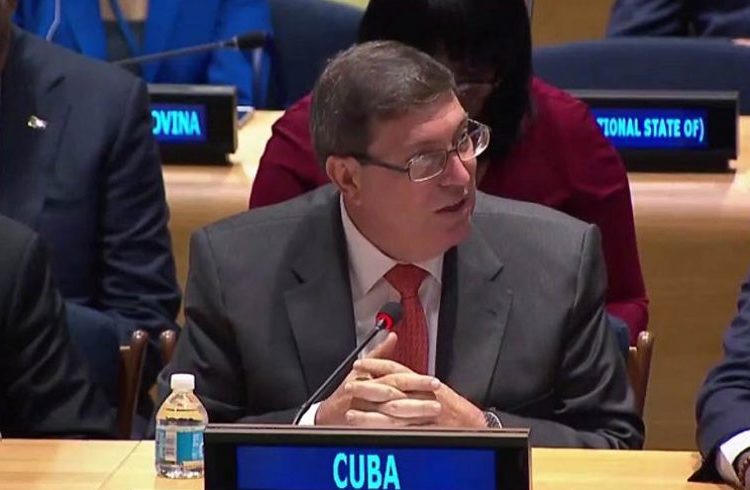Cuban Foreign Minister Bruno Rodríguez affirmed last Friday that U.S. President Donald Trump hasn’t “the faintest moral authority” to judge the island, and regretted the “rollback” that affects bilateral relations.
Cuba “doesn’t need to receive lessons from the United States or from anybody,” Rodríguez affirmed when participating in Friday’s high-level debate session of the UN General Assembly, which is concluding today Monday.
Rodríguez affirmed that when Trump spoke from the same podium last Tuesday he made “disrespectful, offensive and interventionist statements against Cuba and the Cuban government.”
In that speech, Trump, who was making his debut in the UN General Assembly, described the Cuban government as “corrupt and destabilizing” and said that Washington will not lift the sanctions imposed on the island until there are fundamental reforms.
And last Wednesday, U.S. Vice President Mike Pence accused the Havana government of being an “oppressive regime that has repressed its people,” and affirmed that the UN Human Rights Council doesn’t deserve its name for having among its members countries like Cuba and Venezuela.
Rodríguez counterattacked and said that the United States has a “pattern of systematic human rights violations, like the use of torture, detention and arbitrary deprivation of freedom.”
He specifically cited the case of the U.S. Guantanamo Base, “the police killing of Afro Americans, the civil death of innocent people by its troops and the xenophobia and repression of immigrants, even minors.”
According to the Cuban foreign minister, the rapprochement that existed between the U.S. and Cuba under the Barack Obama administration is in a “rollback” after the measures announced last June 16 by the White House.
On that day Trump announced U.S. companies’ prohibition to do business with Cuban companies owned or controlled by the Cuban Armed Forces and restrictions to U.S. citizens’ travel to the island.
The U.S. government “has decided to intensify the economic, commercial and financial blockade, imposing new obstacles to the limited possibilities its business community had to trade with and invest in Cuba,” the Cuban foreign minister affirmed.
These measures, he added, “only meet the interests of a group of Cuban origin in the south of Florida, increasingly more isolated and a minority, which insists on harming Cuba and our people.”
Even so, Rodríguez said that the Havana government is still interested in maintaining a “respectful dialogue” with the United States.
“Cuba and the United States can cooperate and coexist, respecting the differences and promoting all that benefits both countries and peoples, but it mustn’t expect that for this Cuba will make concessions inherent to its sovereignty and independence,” he added.
EFE / OnCuba










